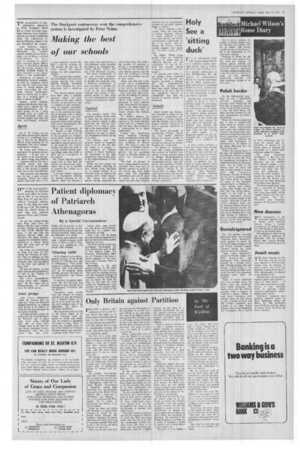Page 3, 14th July 1972
Page 3

Report an error
Noticed an error on this page?If you've noticed an error in this article please click here to report it.
Tags
Share
Related articles
Bishops Don't Want Church Schools Ended
As The Conservative Party Held Its Annual Conference This...
Classrooms Without Catholic Teachers
Catholic Schools In A Period Of Consolidation
Free School Places Cut
Making the best of our schools
THE introduction of com prehensive education in South Stockport which led to a bitter two-year argument between local Catholic schools was finally settled last week. The controversy reflected difficulties likely to be met throughout the country.
Local authority requirements demanded that South Stockport's two Catholic schools should join to form a single, one of them,. a convent
laameeehensive if t fh ey were to continue to receive local authority grants. Bishop Grasar of Shrewsbury decided that the parepts, teachers and parishes involved should be
fully consulted on any scheme
before it was implemented.
Differences of opinion so divided
Spirit
Mr. C. W. Turner said he and other convent girls' parents arrived at a committee meeting to find the St. Michael's School group pressing for an immediate vote on a comprehensivisation scheme.
Mr. Turner said: "When we mentioned the interests of nonCatholics — 50 per cent of the intake of the convent junior school being non-Catholic — someone told us this was a Catholic matter and that others need not be consulted. One of the parents 1 arrived with was in fact non-Catholic.
"The situation was basically that we had a good convent Grammar School and junior school associated with it, with
a good academic record. We held a meeting attended by 700 parents. all bar ten of whom rejected the original scheme for full comprehensivisation.
"The convent had a wonderful environment and spirit and convent parents had raised £80,000 through covenants and other projects for extra classrooms and a swimming pool.
"The obvious merger would have been with a Catholic grammar school, but there was none' in the area. T think the lack of provision for one is a subject of some embarrasment to Catholic authorities.
"Parents felt a bond of loyalty to the convent and objected to merging with a school whose pupils had a very different education and background to those at the convent. Such moves had proved a disaster in other areas."
With the co-operation of Fr. Russell a new working party had been set up to see if the proposals for comprehensivisation could be altered in such a way as to be acceptable to convent parents and to all involved. The convent parents had paid the head of a Leeds Catholic teacher training college more than £200 to carry out an investigation of the scheme.
Mr. Turner said the convent group took as their brief the need to save the convent junior school and as far as possible to preserve the convent as a girls' school.
A revised scheme suggested by the investigation allowing for gradual merging of the schools, which are situated a
mile apart, was approved by a sub-committee which included the head of St. Michael's Secondary Modern School and one of St. Michael's teachers.
On closer examination of the new proposals, however. St. Michael's staff unanimously decided the proposals were a "ludicrous compromise". A letter circulated to parents and the press two weeks ago objected to the new scheme's proposal that during a transitional period of four years the new comprehensive should "operate two single-sex departments."
Cynical
The teachers stated: "The proposed scheme would seem to mean that the parents are being asked to support a plan preserving the 'convent girls' situation for as long as possible to the disadvantage of the education of the boys". They interpreted the plan as delaying comprehensivisation for up to 13 years.
The teachers said: "The proposal would be laughable were it not for the fact that the matter is so serious the education of Catholic children in South Stockport. No headmaster in his right educational mind would agree to the implementation of such a scheme."
Battle was now joined, the convent parents objecting to their efforts being described as "a cynical attempt by a minority group to preserve the 'convent girls' school image."
Mr. Turner said convent parents, having supported the
school financially, had made a big sacrifice in agreeing to become a comprehensive. Sister Sebastian, the convent superior. denied rumours that the nuns were thinking of leaving and said the problem was out of their hands.
Those with their ear to the ground heard condemnation of the number of pregnancies at one school, the number of backward children at another.
Last week both sides accepted the inevitibility of comprehensivisation because no school could afford to be independent of local authority funds. The problem of comprehensives has been shown to have relevance not only for secular schools but Catholic ones as well.
Fr. Russell believes the Catholic comprehensive will be superior to the local authority school tied to a smaller area and will have "the richness of a cross-section of a larger community."
Noting the controversy about sectarian schooling which recommences every time Catholic schools are seen to have problems, Fr, Russell said: "We need to state the importance of Catholic schools today not as 'no-go' areas or ghettos, but as generating houses of Christian culture on which the community can draw.
The lack of purpose of many young people is obvious, especially where they have so sensibly rejected the good salary motive that their elders gave them. The immediate contribution that can be made to society by a secondary school has never been properly realised, and the opportunities increase as the pupil remains longer at school.
"A school without a philosophy, where the staff may be athiest, humanist, Marxist or simply confused in their own basic notions, can hardly communicate a philosophy of life to its pupils." said Fr. Russell. He believes Catholic schools prepare their pupils for "the whole science of living".
He added: "While young people today are extremely sensitive on issues such as tolerance, divorce, sex, and euthanasia." it was in this field that Catholic schools mcouunityldgive a lead to the corn Fr. Russell said neither he nor Bishop Grasar regretted consulting the parents and teachers involved in forming the new comprehensive. though the decision could have been made without any reference to the laity. One of the unexpected bonuses of consultation had been the growth of parents' interest in education.
Attack
Some months ago Humanists launched an attack on the amount of Government subsidy going to Catholic schools, and the Scottish Labour Party passed a motion calling for an end to sectarian education in Scotland.
The whole philosophy of maintaining Catholic schools has been further criticised during the present troubles in Northern Ireland, where schools are blamed for further dividing the communiea The spread of comprehensives has further spotlighted the position of Catholic education, a recent example being in Slough, Buckinghamshire, where the council debate on comprehensivisation was defferred. The question of Catholic schools had come up, and an opinion column in the Slough Observer asked: What case can be made out for making discrimination in education the exclusive preserve of Roman Catholics?"
blog comments powered by Disqus









